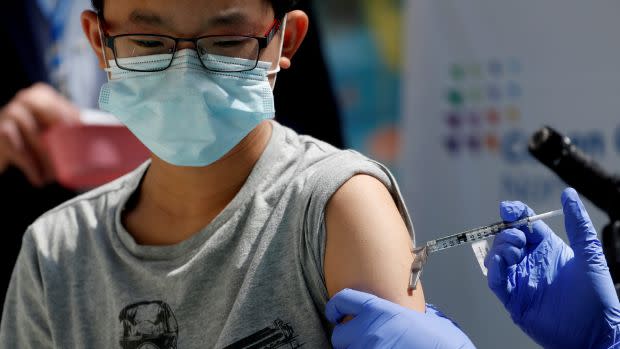America’s kids will be even harder to vaccinate than its adults

Pfizer and BioNTech have results for their Covid-19 vaccine trial on kids, and they are encouraging. The vaccine, administered in two smaller doses than the adult version at a 21-day interval, is safe and effective for children between five and 11 the companies said today (Sept. 20).
Pfizer has to submit the trial results to the Food and Drug Administration (FDA) to obtain authorization and start the inoculation of children. The process will begin at the end of September, and the go-ahead might come as soon as the end of October. Results for vaccine trials on children below five are expected soon, too, and the FDA authorization will follow a similar timeline as the one for kids five to 11.
There are around 48 million children under 12 in the US, and they might all be eligible for a Pfizer vaccine in the near future. But how many will actually get vaccinated is a big question.
Parents are a highly vaccine-hesitant group
Parents tend to be more vaccine-resistant than the general population, especially when it comes to vaccinating their kids, and the charged political climate has made their hesitation stronger. Similarly to mask mandates, sentiment toward vaccines is linked to party affiliation, and Republican are less likely to vaccinate their kids than Democrats.
Vaccinating kids would reduce the risk of outbreaks in schools, which often result in children having to stay home from school and the ensuing childcare nightmares, as well as the risk of spreading the infection among adults. So, some parents can’t wait to get their kids vaccinated, to the point that pediatricians report being asked to administer the vaccine even to kids below 12.
But many others would rather not vaccinate their kids, or wait.
Data from the Kaiser Family Foundation (KFF), a nonprofit focusing on research and analysis of US healthcare issues, indicates only 26% of parents say they will vaccinate their children right away. Just as many say they will definitely not do it, while the others say they will either wait and see (33%) or vaccinate the kids only if it becomes mandatory (14%). Only about half of vaccinated parents said they would vaccinate their kids right away, while only 6% of unvaccinated parents said they would.
The main cause for hesitation was the fear of serious side effects, in particular heart conditions that occur in about one in 5,000 vaccinated male teenagers. According to the KFF, two-thirds of parents had heard of the condition, and half said they feared the vaccine would cause heart problems for their kids.
Parents were more open to vaccinating children aged 12 to 18 before the vaccine became available for them in May. At the time, according to a survey from Education Next, a conservative educational policy publication, only about half of the parents said they would probably or definitely vaccinate their kids, while 34% said they would probably or definitely not vaccinate them, and another 15% said they didn't know.
While children are unlikely to experience serious cases of Covid-19, they have been more vulnerable to the delta variant than to previous strains. Yet so far, adolescents are the least vaccinated group of all the categories for which the vaccine has been approved. Only about a third of teenagers have been fully vaccinated against Covid-19.
Covid-19 vaccines for children under 12 have only been administered in China and the United Arab Emirates.
Combining the apprehension of parents and the fact that some states are unlikely to carry out vaccine outreach campaigns for children, children—or rather, their parents—might soon become the biggest pocket of vaccine resistance in the US.
Sign up for the Quartz Daily Brief, our free daily newsletter with the world’s most important and interesting news.
More stories from Quartz:
Did Canadian prime minister Justin Trudeau make a mistake calling for a snap election?
Economic crisis in Sri Lanka shows organic farming doesn’t happen overnight
